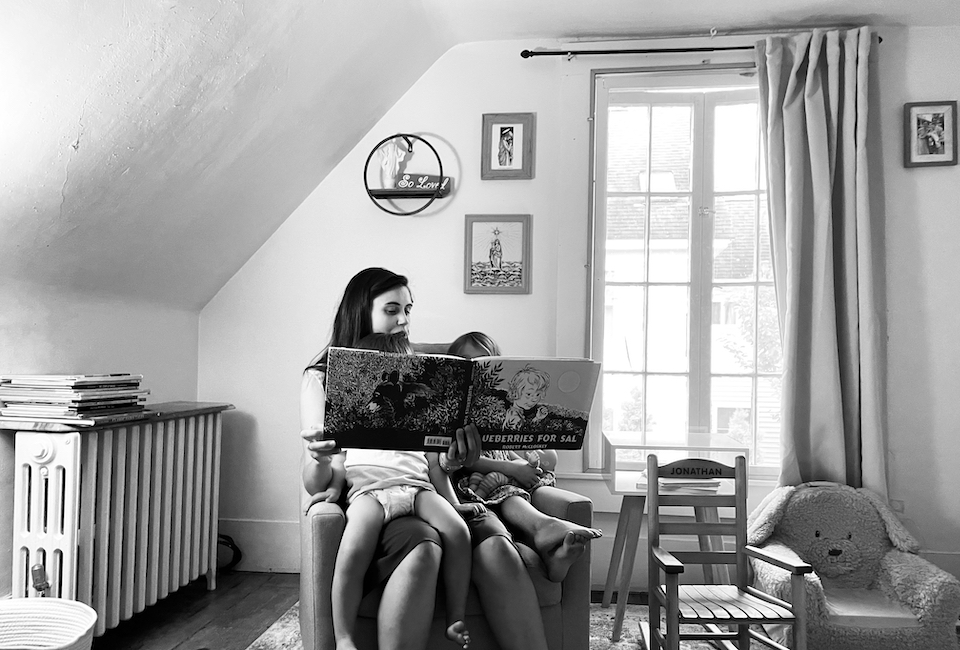Over the past winter, as my daughter’s vocabulary expanded and her penchant for longer books increased, she entered into a spontaneous storytelling phase that still continues today. We might be putting our shoes on for a walk, eating a meal, or riding along in the car and like the outburst of a firework on the fourth of July, she suddenly begins to describe the story playing out in her mind. I always try my best to listen attentively and follow the developing plot, though her style proves cryptic. Each original tale she recounts weaves together bits of real events, parts of books we have read, and other random details that come from her own curious, absorbent brain. I always delight in these ebullient expressions because they extend a peek into her imagination and thrill me with the delicious taste of creativity freely, unapologetically at work.
I’m often surprised by the details children can notice. Their lowered height and tiny features offer them a keener vision of the world that goes on below that of adults. They can distinguish the little black ant blending into the crowd of crumbs already freckled across the kitchen floor or find the stale, forgotten cheerio tucked between the couch cushions. In fascination, I’ll watch my son stoop over a pile of rocks, digging and sorting until he has found the one that meets his secret standards and will gain the elite status of possession in his grubby fist. And the older my daughter grows, the more she surprises me with the phrases she repeats from books I have read over and over, yet hardly noticed before.
Last summer, my sweet younger sister, the baby of our family, gifted me Anthony Doerr’s memoir, Four Seasons in Rome, after I had eagerly read All the Light We Cannot See not long before. In contrast to the complex plot of the latter, Doerr’s memoir offers a closer look at his writing process and the daily habits and disciplines needed to produce a novel. Doerr taught me the skill of noticing the tiny details of each day and practicing this art of observance through daily journaling. The book was essentially a diary of his time in Rome, chronicling his experience as a foreigner made local in the eternal city through a yearlong scholarship. Every page and paragraph enthralled me with his entrancing ability to repaint ordinary life with surprising combinations of words, making even a trip to the grocery a story a curious adventure. Reading Doerr made me want to uncover the stories and details of my own life waiting to be renewed through the written word.
The act of mothering is closely tied with the art of observance. Hidden within the life of raising tiny humans flicker a thousand little details. Like the specks of multicolored paint that make up a masterpiece of Monet, each delicate detail of our life shapes our own humble stories. Writing is a tool through which we tell these stories and by recreating them through our own words, we learn something new about the story our life is telling. Reading books invite us into other worlds, letting us wrestle with them in our imaginations and make connections between the stories of others and our own. Sometimes, my daughter will watch this sweet show called The Wonderful World of Benjamin Cello. It’s filled with little lessons and songs from scripture, literature, and nature. In one episode titled, “The Book Swap,” several characters come together to exchange books and in one of the songs, they sing that when you read a book, “the world will come right down to where you are.” I can think of no simpler way to describe the gift of reading, and for children who are slowly coming to realize the enormity of the world, books are a way to make the threshold of growing up less intimidating.
When my daughter was about two and a half, I bought her a little pink notebook of her own. After she had sneakily scribbled in several of my own journals stashed in various corners of our home, I decided she needed some lined paper of her own on which to squiggle out the dashes and dots that she called her poetry. Delighted to have her own space to doodle, she came up to me one day, handed me the little blank notebook and asked me to “read the story of [her] life.”
“Did I really just hear her say that? What exactly does she mean?” I thought to myself.
My mind blazed into focus, lest it forget this precious story-worth moment. It was one of those times when you ask yourself if this whole mothering thing is actually real life and the eternal miracle of your little humans glimmers more vividly than anything else.
As she settled herself next to me, I started to tell her the story of her birth, her continued growth and the love Daddy and I had for her. And as I described our exponentially increasing love, she looked up, put her little hand on her chest and said simply, “my heart.” If I was a crier, I would have been bawling, but inside, my own heart was bursting at her tender recognition of our lives bound up together in a new tale of love.
Often, I take for granted the stories I am writing with my children in those humbling moments. I forget that I am the one responsible for teaching them the art of observance, of noticing the plot that binds together all of humanity. God didn’t choose to give us the Bible as the foundation of our faith for nothing. He built within us the predisposition for storytelling and reading. Stories are our way of making meaning and sense of the world. And when we choose to put pen to paper and create our own combination of words, or read the words of others, we find renewal by placing ourselves in a posture disposed to marvel at the creativity of the Creator. Even though there are millions of writers who express themselves better than my ordinary hand, I know that the Lord delights in my humble efforts in the same way a mother of many children will celebrate the milestones of each child with the same level of awe. And the same is true for you, dear reader.
When I choose to guide my children’s growth through the framework of story, I begin to understand my purpose more deeply and the ending of eternity appears more clearly along the horizon of life. Every difficult season or moment of astonishing joy, every tiny detail works together to create a plotline that only God could design. I am here only as His humble pen, trying my best to carry out His artistic vision and ever deepen my wonder at the Love Story that He is writing through each of our lives.




